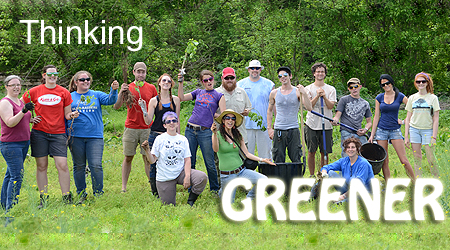Dr. Wendy Francesconi in the MTSU School of Agribusiness and Agriscience and her sustainable agriculture class are using the warm spring weather to get outside and work at the University’s farm.
The students have been planting buttonbush and cottonwood trees to help improve the water quality of the nearby East Fork of the Stones River.

Sustainable agriculture class members take a break from planting buttonbush and cottonwood trees to help improve the water quality of the East Fork of the Stones River at the MTSU farm off Guy James Road in Lascassas. (MTSU photos by News and Media Relations)
Francesconi’s class planted rows of trees at the MTSU farm off Guy James Road in Lascassas on April 4. One row served as a living fence along the old farm road.
Another, planted along the river, will increase the area of the riparian buffer strip between the land and the river, which Francesconi says will further the sustainability of the MTSU farm.
“Most non-ag students would probably have an old-fashioned image of farming,” says global-studies major Elizabeth Grady, one of Francesconi’s students. “I would encourage them to go out to the farm for field days and get a tour.”
“The MTSU farm is becoming a role model for sustainable farming,” Francesconi says. “The farm currently uses clean energy technology, rotational cattle grazing and nutrient recycling practices. The farm is also engaged in the organic production of fruit and vegetables as well as in the production of alternative farm goods such as honey.”
She adds that planting trees along the river is important for both wildlife and people.
“Planting trees or shrubs along the river is important to help trap sediments and nutrients from the farm operations” the instructor says.
“The trees can also help stabilize the river bank, remove excess water during the rainy season through evapotranspiration and provide habitat to many birds and beneficial insects and wildlife in general. They also make our farms and landscapes a much more beautiful place.”

Courtney Bowers, left, and Claire Barnett plant a row of trees that will serve as a living fence along the old farm road alongside the East Fork of the Stones River. Barnett is a senior agribusiness major from Normandy, Tenn., while Bowers is a junior animal science major from Ooltewah, Tenn.
The tree enrichment of the riparian buffer is part of the course curriculum. The students had to design their own tree-planting plan to restore their assigned portion of the river edge. With proper execution, each student’s design will help limit some of the erosion that often occurs during flooding season.
Francesconi joined MTSU’s faculty in January 2011 as a Minority Dissertation Fellow, a provost’s initiative that gives minority graduate students an opportunity to improve their teaching skills.
She calls teaching at MTSU “a wonderful experience,” and her students seem to agree. Before class even began, they recalled, they enthusiastically discussed a new study on ways of disposing of waste.
One student mentioned that she had so much to say on her mid-term exam that she added extra pages to the test. With such a passionate group of farmers, the MTSU farm is sure to reap the benefits.
Grady says she feels “sad that this is Wendy’s last semester at MTSU. She brings fun, energy and excitement to her class. She is also very well informed and educated in a diverse field of agriculture and sciences. Coming from Colombia also helps her to bring a world viewpoint to bear on agricultural practices.”
— Rachel Nutt (news@mtsu.edu)


COMMENTS ARE OFF THIS POST